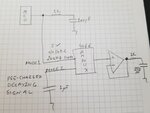seyyah
Advanced Member level 2
I have a intermixed input signal of 100 KHz (Ican reduce it to 50KHz if required) pulsed signal @5V and a very low frequency signal. In mode one, the input signal is high frequency; in mode two, it is near DC below 5V. I need an exact copy of this signal. I tried to use TL3472 in unity gain voltage follower but the output has amplitude loss.
What do you suggest me? I have OPA1662 and LM358 in my stock currently. I can buy another one if required.
What do you suggest me? I have OPA1662 and LM358 in my stock currently. I can buy another one if required.
